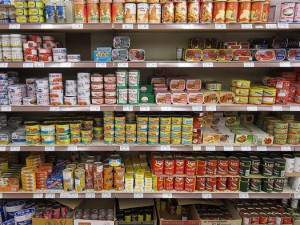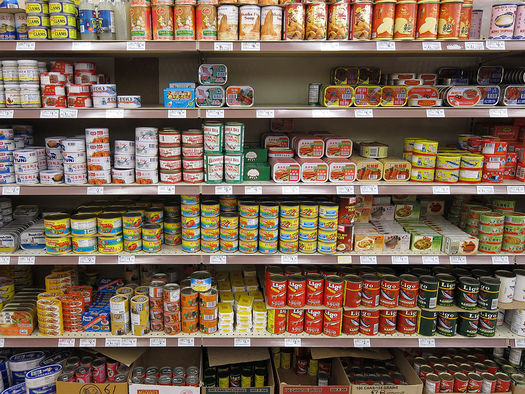 How many cans do you have in your grocery cupboard right now?
How many cans do you have in your grocery cupboard right now?
It’s estimated that nearly a fifth of the American diet is made up of canned foods. The reason for that is obvious, they’re convenient.
Whether it’s a heat-and-eat can of soup, a tin of beans or a can of corn, canned foods give us the convenience of food that can be stored for long periods of time and prepared in the time they take to heat up.
This makes them easy to stock-pile. It also makes them an easy choice for rushed parents who need to feed hungry kids with minimum fuss.
The problem is these canned foods could be poisoning you. Here are some reasons why:
Canned foods and BPA
One of the biggest concerns about canned foods is that they have been proven to contain dangerous levels of BPA. Bisphenol A (or BPA) is a type of plastic which is used to coat the inside of cans and tins to make food last longer.
BPA use is restricted in Canada and several US states because of its proven adverse health effects. Federal guidelines have placed the upper daily limit of BPA exposure at 50 micrograms per kilogram of bodyweight. These limits are based on research sponsored by the plastics companies in the 1980’s. An FDA advisory panel has recently called for these levels to be re-evaluated as recent studies show that even small doses can have seriously bad effects on our health.
The FDA’s National Center for Toxicological Research did several studies on rats to determine the effects of BPA on our health. Here’s what they found: BPA is passed from expectant mothers to their unborn offspring; BPA is linked with obesity due to its endocrine disrupting effects; BPA causes thyroid dysfunction; BPA alters glucose and Lipid metabolism in mammals; BPA causes neurological effects that are especially worrisome in children. These include poor behavior, and long term effects on fetal and infant brain development; BPA has also been linked with Cancer, Asthma, and low fertility in males.
Consumer Reports did spot testing on various canned products in the greater New York area. What they found is that many cans contain much higher levels of BPA than the FDA approved amount. Even some products claiming to be organic and BPA-Free were found to contain BPA.
If the BPA in your cans isn’t enough to scare you then maybe the aluminum will be.
What are your cans made of?
Aluminum
It’s not just BPA that need to worry about. Most beverage cans are made from aluminum – which is also a major problem for your health. Although it’s mostly beverage cans that are made from aluminum some food storage cans are made from this metal as well. You will know it by its bright appearance. It’s lightweight and cheap to manufacture. It also leaches into food and drinks easily.
Aluminum has been proven to be a neurotoxin (it’s toxic to your nervous system) and is generally accepted as being the root cause of Alzheimer’s disease. When aluminum is combined with a high-cholesterol diet it is even more toxic. The two work together to create what are known as “senile plaques”. These clog up human brain matter and cause progressive mental degeneration – Alzheimer’s.
Aluminum also causes inflammation. As we know from so many tests and articles that have been done before – anything which causes inflammation in the human body is trouble. Prolonged over-inflammation of any group of cells in the body is the starting point for mutations, irritations and ultimately cancer. See our article on the effects of sugar for more information on the problems caused by inflammation.
Tin
Tin has its own set of health risks associated with it.
As we discussed above, most tin cans are lined with BPA plastics to make them last longer. The reason why the lining is necessary in the first place, though, is because tin oxidizes with air, causing it to rust. Rust In food can cause a toxin called botulism. Although extremely rare, it is a deadly food poisoning. Even small quantities of botulism are fatal. It’s for this reason that you should never, ever eat from a can that’s been punctured, badly dented or is starting to rust.
Canned foods destroy Antioxidants and Useful Enzymes
Another reason we don’t like our food in cans is that cans destroy useful enzymes and antioxidants. The thing that makes canned food last so long is the process used to “can” it. The food is placed inside the can, sealed, and then heated to very high temperatures to kill any enzymes that might cause decay.
The problem is it also kills off the good enzymes in food. These enzymes are proteins, and destroying them means that your body is not only getting less nutrition from your food, it is also less able to absorb the nutrients that are left.
Another enzyme that this high heat method destroys are biophotons. Biophotons are essentially light energy that food stores. It is essential for good health and good food should be rich in biophotons.
Antioxidants are essential for helping your body to heal itself, preventing cancer and ensuring good health. Unfortunately this high heat process destroys antioxidants too. Even foods that would naturally be high in antioxidants will lose them after being canned. So you may think you are eating something that’s antioxidant rich – but because it comes out of a can, you are just eating empty calories instead.
Alternatives to Canned Food
You need to decide what’s more important to you – convenience or your health? It may be easier to stock up on a cupboard full of tin cans that are ready to heat and eat – but it’s not healthy.
Cook Fresh Foods
Cooking fresh food doesn’t really take that long and it is so much better for you. By eating fresh food you avoid all of the potential problems outlined above, because your food hasn’t been exposed to BPA or aluminum. You also know for certain that your food has the maximum levels of nutrients in it – because nothing has been processed or taken away. Last but not least when you cook fresh food from scratch you know exactly what you’re eating. There’s no way a manufacturer may have snuck sugar or MSG into your food when you cook fresh.
Cooking from scratch doesn’t have to be as time consuming as we make it out to be, either. Usually it’s deciding what to cook that takes the most time.
If you plan ahead each week and make sure that you have all the fresh ingredients you need you should be able to prepare you own meals easily, it helps to have your recipes picked out in advance. Then you can always cook surplus and freeze some for those rushed days when you need something to “heat and eat” in a hurry.
Buy In Glass
Glass is a far safer option than cans. If you still want to buy a readymade sauce, preserve or jam but don’t want the risk of BPA or aluminum poisoning then try to find the product you want in a glass jar. Most manufacturers do offer a glass option. Glass is also great because it’s so easy to re-purpose around the home. Empty glass jars can be used for so many things, or you can just send them to be recycled.
Be “Can” safe
If you do buy cans and tins, make sure that you buy only the best. Look for cans that claim to be BPA free. Studies have shown that even these are often found to contain BPA but at least the levels should be lower.
Try to make sure that the cans you buy are not made of aluminum. A quick way to check this is with a magnet. Magnets stick to regular steel tins, they don’t stick to aluminum. If the magnet doesn’t stick, don’t buy it.
Once you open a can of something, pour the contents into a glass jar for storage. As soon as you open a tin, the leaching of chemicals into your food is accelerated. It can also rust more quickly once it’s open. Pouring food into glass will minimize the chance of your tins rusting on your food and potentially growing the bacteria that cause botulism.
When in doubt – go the natural route. There is nothing safer than eating fresh foods that you cooked yourself, and probably nothing tastier either.
With the increasing amount of toxic processed food, it is important to boost your immune system from these toxins.
Go to the next page and learn more about the immune boosting elixir that you can eat for better immunity.
References:
http://www.fda.gov/NewsEvents/PublicHealthFocus/ucm064437.htm
https://en.wikipedia.org/wiki/Bisphenol_A
About the Author:
Emma Deangela is the best selling author of The Alkaline Diet Program and 80/20 Fat Loss. She has helped over tens of thousands of men and women to lose weight and transform their health with sound nutrition advice. Check out her 4 foods to never eat for breakfast video to lose more than 18 lbs in 3 weeks.
Which wonderful friends in your life would appreciate this information about canned foods?
Please help them by sharing this eye-opening article with each of them using any of the social media and email buttons below.


Leave a Reply